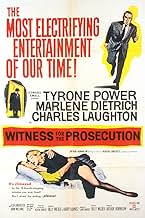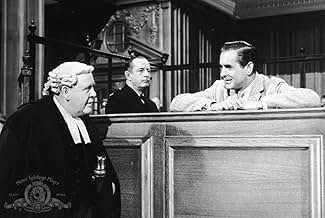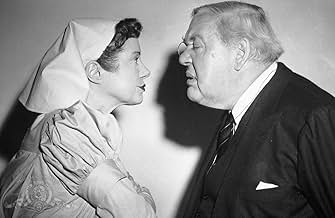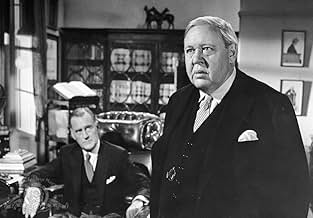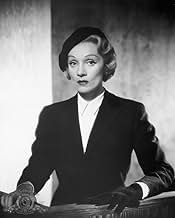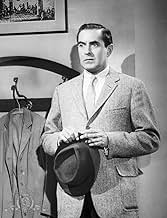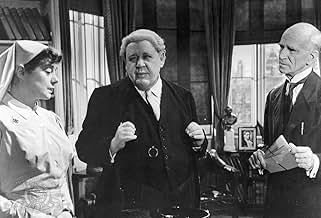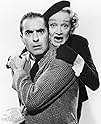Um veterano advogado britânico deve defender seu cliente em um julgamento de assassinato que tem surpresa após surpresa.Um veterano advogado britânico deve defender seu cliente em um julgamento de assassinato que tem surpresa após surpresa.Um veterano advogado britânico deve defender seu cliente em um julgamento de assassinato que tem surpresa após surpresa.
- Direção
- Roteiristas
- Artistas
- Indicado a 6 Oscars
- 3 vitórias e 15 indicações no total
Patrick Aherne
- Court Officer
- (não creditado)
Don Ames
- Bar Patron
- (não creditado)
Larry Arnold
- Courtroom Spectator
- (não creditado)
Walter Bacon
- Bar Patron
- (não creditado)
Eddie Baker
- Courtroom Spectator
- (não creditado)
Resumo
Reviewers say 'Witness for the Prosecution' is celebrated for its intricate plot, masterful direction by Billy Wilder, and standout performances by Charles Laughton and Marlene Dietrich. The film delves into themes of justice, deception, and complex human relationships within a gripping courtroom drama. Its twisty narrative and surprising ending are often praised for enhancing suspense and entertainment. Despite minor critiques on pacing and some performances, the overall reception is highly positive, marking it as a genre classic.
Avaliações em destaque
In a recent biography of Billy Wilder, Agatha Christie is quoted as saying that this was the best adaption of her work ever done on the screen. I can't praise Witness for the Prosecution any higher than that.
Tyrone Power in his farewell film plays Leonard Vole who befriends a dotty old widow played by Norma Varden. She even rewrites her will leaving him the bulk of a very large estate. When she's murdered, Scotland Yard arrests Power.
Power's solicitor Henry Daniell retains a dream team for defense of John Williams and the recently recovered Charles Laughton. Laughton is recovering from a heart attack and against medical advice plunges into the case. Laughton also has to deal with the efforts of his assigned nurse Elsa Lanchester to keep him following doctor's advice.
The original play this was taken from concentrated completely on the Power character and the machinations of his wife. Wilder built up the character of the nurse and barrister Sir Wilfred Robards so that they almost equaled the screen time of Mr. and Mrs. Vole. So much so that Charles Laughton was nominated for an Academy Award in 1957, but lost to Alec Guinness.
Marlene Dietrich plays Mrs. Vole. She's a war bride over from Germany and she's got her own agenda going. Her performance and what her character does is the key to the whole film. Dietrich probably would have gotten an Oscar nomination herself, but due to the fact that if her performance was hyped up for Academy consideration, the element of surprise would have been lost in the film. Wilder in fact apologized to Marlene for that.
The Anglo-Saxon legal system's goal is justice. Justice is served though not quite in the way it usually is in Witness for the Prosecution.
Tyrone Power in his farewell film plays Leonard Vole who befriends a dotty old widow played by Norma Varden. She even rewrites her will leaving him the bulk of a very large estate. When she's murdered, Scotland Yard arrests Power.
Power's solicitor Henry Daniell retains a dream team for defense of John Williams and the recently recovered Charles Laughton. Laughton is recovering from a heart attack and against medical advice plunges into the case. Laughton also has to deal with the efforts of his assigned nurse Elsa Lanchester to keep him following doctor's advice.
The original play this was taken from concentrated completely on the Power character and the machinations of his wife. Wilder built up the character of the nurse and barrister Sir Wilfred Robards so that they almost equaled the screen time of Mr. and Mrs. Vole. So much so that Charles Laughton was nominated for an Academy Award in 1957, but lost to Alec Guinness.
Marlene Dietrich plays Mrs. Vole. She's a war bride over from Germany and she's got her own agenda going. Her performance and what her character does is the key to the whole film. Dietrich probably would have gotten an Oscar nomination herself, but due to the fact that if her performance was hyped up for Academy consideration, the element of surprise would have been lost in the film. Wilder in fact apologized to Marlene for that.
The Anglo-Saxon legal system's goal is justice. Justice is served though not quite in the way it usually is in Witness for the Prosecution.
At the end of the day the films you give top marks are those films that become constant companions. You can see them again at the drop of a hat, you show them to people who have never see them and it's always a triumph. "Witness For The Prosecution" is one of those wonders. Suspend your disbelief for a couple of hours and enjoy this banquet of a romp. Charles Laughton showed here what he was made of better, more clearly and more loudly than in any other film and all of his films, at least the moments with him in it, are unforgettable - Captain Blight or Henry VIII, Quasimodo or that malefic Senator from South Carolina. Here the severity of his lawyer by vocation takes your senses away with his masterful judicial way to see logic and it's such an incredible fun to watch him do it. Tyrone Power is a toy in his hands but not Marlene Dietrich who stands her ground, not merely as a character but as a presence on the screen. Billy Wilder visits early Hitchcock territory with wit and fun. Elsa Lanchester's nurse is the cherry on top of this delightful film.
To see "Witness for the Prosecution" for the first time in 2008 is a jolting surprise. Nobody could do it better than Billy Wilder did in 1957. A man accused of murder, Tyrone Power, the weakest link in this terrific chain. Sir Wilfred is called to defend him, he is played by the extraordinary Charles Laughton, but he's just out of hospital - he wasn't dismissed he was expelled - and due to doctor's orders he's not to take any criminal cases. He finds Power charming and personable enough but he's not going to risk his life to save his until Marlene Dietrich makes her entrance - and what an entrance! How marvelous that what amounts to a bit of Agatha Christie's usual fare becomes such an entertaining and at times right down riveting piece of film-making.
I love it when a movie captivates me, carries me along, then surprises me at the end. This is a masterpiece of human maneuvering. It has outstanding acting and a plot to die for. This is a fairly pedestrian Agatha Christie short story. I'm not saying it's not a wonderful story, just that it doesn't come to life like it does on the screen. Charles Laughton is the wonder barrister who is taking the case, even though he is in poor health. The murder case seems a relatively simple one until we begin to trip over the many layers left lying on the path. Marlene Dietrich does a masterful job in all her roles (I won't say anymore than that so I don't spoil the ending). Tyrone Power is able to balance his pathos and his potential guilt. The beauty of the movie is that it never takes itself too seriously. There are some modestly funny subplots and a great deal of careful investigation. I guarantee you that once you start watching, you won't be able to turn it off.
Yours truly has never been much of a reader, though with one notable exception: the work of Agatha Christie. I absolutely, positively worship this brilliant woman and try to read as many of her novels, short stories and stage play adaptations as possible. "Witness for the Prosecution" is a genuine classic, and although somewhat atypical for Christie, it is undeniably one of the greatest stories ever penned down. There's one major disadvantage about having read all of Christie's whodunits, of course, namely that you can't experience the same astounding twist-in-the-end twice! I would really have loved to be overwhelmed by the climax of this film- version, especially because Marlene Dietrich and Tyrone Power give away such fabulous performances. The story, with its fascinating characters and dazzling plot twists, does remain the movie's biggest strongpoint, but there are a number of more reasons why "Witness for the Prosecution" is righteously considered as one of the most massive milestones in cinematic history. Billy Wilder's surefooted direction, for one, and the stellar performances of the entire ensemble cast. I mentioned Dietrich and Power already, but there's also the downright phenomenal Charles Laughton (arguably the most shamefully neglected actor/director in history) and an appealing supportive role for Elsa Lancaster. But do I daresay that the ultimate success-factor of this stage play adaptation is the masterful re-creation of the court trial? The bombastic settings and decors, the echoing acoustics, the powerful monologues of confident (and arrogant) barristers and the intimidating gowns and wigs are largely what make "Witness for the Prosecution" not only the first but also the mother of all courtroom dramas. This may just be the opinion of an avid fan, but practically ALL great courtroom-dramas that were released from the sixties until present day ("To Kill a Mockingbird", "Philadelphia", "Devil's Advocate", "A Few Good Men"
) were clearly influenced by "Witness for the Prosecution". In fact, I only have one minor complaint: *** Spoiler **** the film version adds one more final twist that I didn't find 100% plausible.
Você sabia?
- CuriosidadesCharles Laughton, who could be moody and difficult, was apparently a dream to work with, throwing himself into the role with dedication and delight. Billy Wilder later recalled a day that was set aside just for shooting reaction shots of the jury and courtroom crowd (composed of extras hired only for the day). Normally, the assistant director would read the actors' lines, and the extras would react. However, Laughton, who was fascinated with the whole process of filmmaking, begged to help. So he came in on his day off and read all of the off-camera speeches to the jury members. He not only read his part but also the judge's, the prosecutor's, and even Marlene Dietrich's. According to biographer Maurice Zolotow in his book "Billy Wilder in Hollywood", "it was an exhibition of craftsmanship such as Wilder had never seen. He believes that Charles Laughton had the greatest technical range and power of any actor, man or woman, whom he has known."
- Erros de gravação(at around 9 mins) Inside his chamber, Sir Wilfrid lights his cigar, and Leonard Vole locks the door to make sure that Miss Plimsoll can't enter the room and catch him smoking. Later (at around 15 mins), Wilfrid leaves his chamber without first unlocking the door.
Actually, Vole does not lock the door, but puts the keyhole cover in place to stop Plimsoll spying through the keyhole.
- Citações
Sir Wilfrid: I am constantly surprised that women's hats do not provoke more murders.
- Cenas durante ou pós-créditosAs the end credits appear on screen, an announcer's voice is heard: "The management of this theater suggests that for the greater entertainment of your friends who have not yet seen the picture you will not divulge to anyone the secret of the ending of Witness for the Prosecution."
- Trilhas sonorasI May Never Go Home Anymore
Music by Ralph Arthur Roberts
Lyrics by Jack Brooks
Sung by Marlene Dietrich (uncredited)
Reprised a cappella by Tyrone Power (uncredited)
Principais escolhas
Faça login para avaliar e ver a lista de recomendações personalizadas
Everything New on Prime Video in July
Everything New on Prime Video in July
Your guide to all the new movies and shows streaming on Prime Video in the US this month.
Detalhes
- Data de lançamento
- País de origem
- Idiomas
- Também conhecido como
- Testigo de cargo
- Locações de filme
- Empresa de produção
- Consulte mais créditos da empresa na IMDbPro
Bilheteria
- Orçamento
- US$ 3.000.000 (estimativa)
- Faturamento bruto mundial
- US$ 7.903
- Tempo de duração1 hora 56 minutos
- Cor
- Proporção
- 1.66 : 1
Contribua para esta página
Sugerir uma alteração ou adicionar conteúdo ausente

Principal brecha
What is the streaming release date of Testemunha de Acusação (1957) in Brazil?
Responda
![Assistir a Trailer [OV]](https://m.media-amazon.com/images/M/MV5BNTM2MjYzMjAtZjI5MC00YTI1LWI2MzAtMWFlNDc2OTU1MTRiXkEyXkFqcGdeQXRyYW5zY29kZS13b3JrZmxvdw@@._V1_QL75_UX500_CR0)
